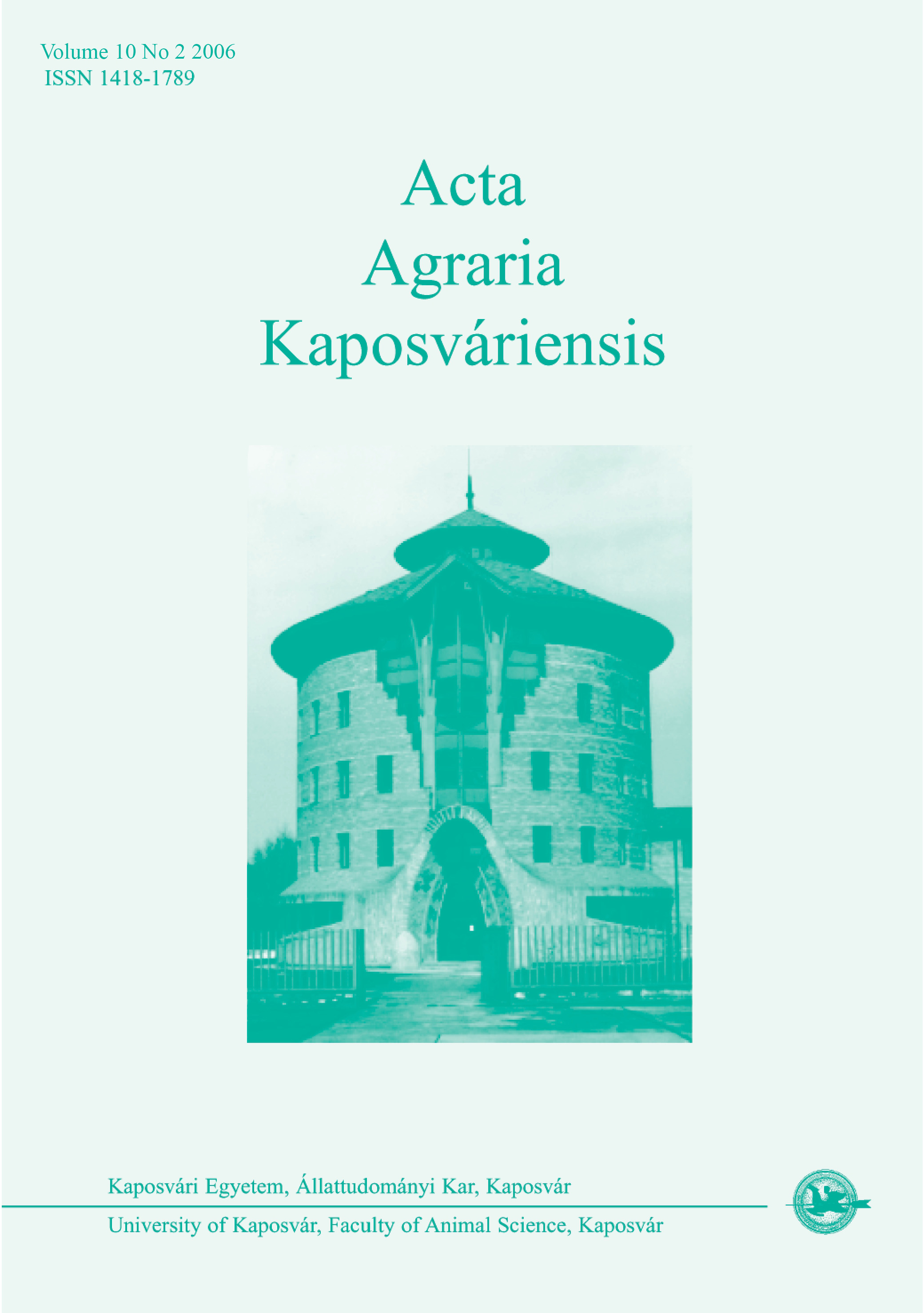Compound feed as a factor influencing the food quality and safety
Kulcsszavak:
animal nutrition, feed quality, food quality, food safetyAbsztrakt
The paper discusses on the basis of data from the literature and the results of the author's own research work how animal nutrition can be used in the "from farm to fork" chain to influence the quality of pork and poultry meat and the safety of animal products. The relevant results show, that for example in pig nutrition different ileal digestible lysine/energy (IDLYS/DE) ratios will essentially determine the fat content of meat and consequently the quality of the product. The article also highlights the fact, that the dietary IDLYS/DE ratio of genetically improved pigs substantially differs from that of the normal hybrids. While in the diet of a genetically improved pig the required IDLYS/MJ DE ratio is 0.7 g during the first phase of fattening (20–55 kg) and 0.6 g in the second phase of fattening (55–100 kg), these ratios for the normal hybrid are 0.6 and 0.5 g IDLYS/MJ DE, respectively for the two weight categories. This paper also warns, that if animal feed proteins, animal fats and various feed additives are used in a unprofessional manner, they may present a potential risk factor for the safety of the animal food product. The results of the studies discussed lead to the conclusion, that in the "from farm to fork" chain it is extremely important for the safety of products to define clear and unequivocal quality criteria and to establish an official and comprehensive control for each element of the product chain. The author proposes to conduct further systematic studies in accordance with the "from farm to fork" concept in the interest of producing high quality and safe animal food products.
Hivatkozások
Arbuckle, D. L., Mackinnon, M. J., Innis, S. M. (1994). Formula 18:2 (n-6) and 18:3 (n-3) content and ratio influence long-chain polyunsaturated fatty acids in the developing piglet liver and central nervous system. Journal of Nutrition, 124(2), 289–298. https://doi.org/10.1093/jn/124.2.289
Babinszky, L. (1996). The feed- to food- to- environment chain possibilities in nutrition to improve meat quality and to reduce nitrogen and phosphorus excretion in pigs. Animal Production, Healthy Nutrition, Environment. 4th Internaional Symposium. “Animal Science Days, Kaposvár”. 7–23.
Babinszky, L. (1998). Dietary fat and milk production. In: The Lactating Sow. M.W.A. Verstegen. (Eds. Moughan, P.J., Schrama, J.W.). Wageningen Pers. 143–158.
Babinszky, L., Tossenberger, J., Pálmai, L., Karakas, P., Szabó, J., Horn, P. (1998). The effect of formic acid on ileal digestibility of amino acids and on performance in weaned piglets. Journal of Animal Science, 76(1), 181.
Babinszky, L., Tossenberger, J. (2003). Alternativ growth promoters in poultry- and swine nutrition [in Hungarian]. Mezőhír, 3. 85–88.
Babinszky, L., Vincze, L. (2004). Utilization of crystallized amino acids in the feeding of farm animals. In: The Status of Protein Management in Hungary and the Strategy for Development. [in Hungarian. Figures, charts and summary in English]. (Ed. Babinszky, L.). Agroinform; Hungarian Academy of Sciences, Dept. of Agr. Sciences, Budapest. 113–160.
Barlow, S., Pike, I. H. (1991). Humans, animals benefit from omega-3 polyunsaturated fatty acids. Feedstuffs, 63. 18–20.
Bikker, P. (1994). Protein and lipid accretion in body components of growing pigs. Effect of body weight and nutrient intake. Ph.D. Thesis. Wageningen Agricultural University. The Netherlands.
Biró, G. (2000). Food safety. In: G. Biró and Gy. Biró. Food Safety Human Nutrition – Public Health. Agroinform Budapest. 19–208.
Chanmugam, P., Boudreau, M., Boutte, T., Park, R.S., Herbert, J., Barrio, L., Hwang, D. H. (1992). Incorporation of different types of n-3 fatty acids into tissue lipids of poultry. Poultry Science, 71(3), 516–521. https://doi.org/10.3382/ps.0710516
Close, W. H. (1994). Feeding new genotypes: Establishing amino acid/energy requirements. In: Principles of Pig Science. (Eds. Cole, D. J. A., Wiseman, J., Varley, M. A.). Nottingham, University Press. 123–140.
Gill, C. (2006). Feed more profitable, but disease breeds uncertainty. Feed International. January. 5–12.
Halas, V., Babinszky, L. (2000). Modelling of performance and protein and fat deposition in pigs: a review. Krmiva. 5. 251–260.
Hofmann, K. (1993). Quality concepts for meat and products [in German]. Fleischwirtschaft, 73. 1013–1019.
Hulan, H. W., Ackman, R. G., Ratnayake, W. M. N., Proudfoot, F. G. (1988). Omega-3 fatty acid levels and performance of broiler chickens fed redfish meal or redfish oil. Canadian Journal of Animal Science, 68(2), 533–547. https://doi.org/10.4141/cjas88-059
Szabó, Cs. (2001). Determination of protein and fat content in growing and fattening pigs by the means of computer tomograph, using different lysine to digestible energy ratios in the diet. Ph.D. Thesis. University of Kaposvár, Hungary.
Letöltések
Megjelent
Folyóirat szám
Rovat
License
Copyright (c) 2006 Babinszky László

This work is licensed under a Creative Commons Attribution-NonCommercial-NoDerivatives 4.0 International License.






